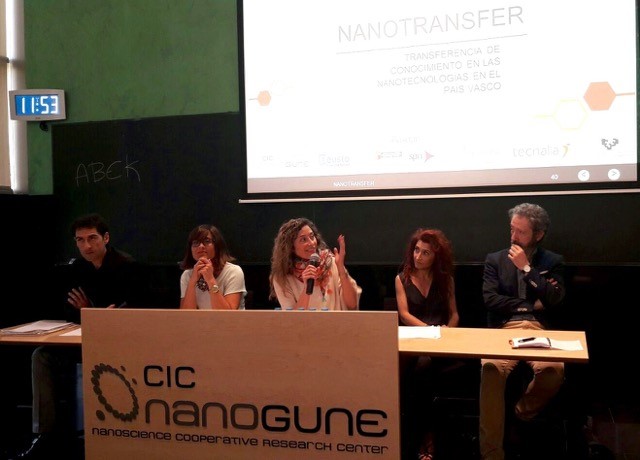Related news by tag Cooperation
Miryam Asunción: “The Basque Country needs to transform its industry through innovation and stem the de-industrialization processes of recent years”

Despite the overall success of the Basque industrial sector, “in trying economic times there is a need to further boost the area’s global competitiveness, and the question remains as to how this relatively small region can achieve this revolution”, affirms Miryam Asunción, nanoGUNE’s Technology Transfer Manager, regarding the Basque Country’s industrial model. The Basque Governments smart specialization strategy (RIS3) addresses this challenge based on three areas: advanced manufacturing, energy, and bioscience and health, in order to build a strong, competitive economy based on R&D. Micro- and nanotechnologies are considered as 'key enabling technologies' that "drive innovation and result in cost-effective solutions for the industry and service sectors.
Asunción points out that key to achieving this conversion is "the application of a cluster strategy to develop a concentration of interconnected businesses, suppliers and associated institutions". This would be also the objective of the nanoBasque Agency. However, as nanoGUNE's TechTransfer Manager says, "the economic expansion of micro- and nanotechnologies in the Basque Country is not yet a reality, as the gap between scientific and technological capabilities and their economic exploitation by companies seems more marked than in other advanced regions".
In this article, Asunción highlights some specific challenges of Basque 'CIC' centers that should help to achieve the final goal: the transfer of technical knowledge or technology from one organizational setting to another, generating economic value and industry development. One of these challenges is to generate a systematic process of technology transfer from public research organizations to the business sector for economic growth. CIC's also have to "work closely with companies within the manufacturing industry to bridge the gap between science and industry, and tailor collaborations to meet the requirements of the companies involved". Moreover, as the commercialization of scientific breakthroughs can take different forms, every technology transfer process must be adapted to its own requirements.
Asunción also gives a last word of advice regarding the relationship between researchers and company manager: "scientist have to become experts in the market of their research result or product, and businesses have to gain a more scientific understanding of the value of research".
Measures to increase business demand for nanotechnology

One of the major conclusions of the Nanotransfer project is the widespread permeability and multisectorial presence that nanotechnologies will achieve in coming years. In the opinion of the researchers from the six organisations that make up this consortium, the Basque Country must continue intensifying the development of nanotechnologies and their incorporation into the business sector. According to the project final report, unlike what has happened with other recent technologies, like ICT (Information and Communication Technologies) and biotechnologies, nanotechnologies will not form their own sector, but instead will be present in all sectors. Therefore, this project underlines, it is vital to facilitate the transfer to the market and the business exploitation of the progress made in the field of research.
The Basque Country lies in an intermediate position as regards the creation of nanoscience and nanotechnology patents in Europe (EU28), but not regarding their application in industrial processes and products, where its position is weaker. The need for specific equipment and instruments, the investment required by companies and the lack of qualified staff are major entry barriers that hinder the incorporation of nanotechnologies into industry.
Nonetheless, 60% of the Basque companies that have started to incorporate nanotechnologies acknowledge that they have obtained a new or improved product, and 30% confirm that they have achieved new or improved production processes.
The Nanotransfer project recognises the significant role played by existing companies of a certain size, with the capacity to invest in R&D activities when promoting the development of nano- and microtechnologies, unlike the situation in other fields, like biosciences, where the momentum takes place in start-up companies which have close links with universities and research centres.
Nanosciences and nanotechnologies in the Basque Country
Analysis of the current situation in the Basque Country shows different types of companies with nano-and microtechnological applications. Three main groups can be identified:
- Nanomaterials: group made up of larger companies, mainly in the metallurgical, chemical and plastic manufacturing sectors. These companies are relatively well-established in the market and perform product innovation activities.
- Nanobiotechnology: group made up of newer, smaller companies, created as spin-offs by the pharmaceutical industry from research centres, universities, etc. They are R&D intensive companies that incorporate nanotechnologies into their products.
- Micro-nanoelectronics: group made up of medium-sized companies that have incorporated micro- or nanotechnologies into their products.
Nearly three-quarters of companies with nanotechnological activity belong to the industrial sector, while the remaining quarter are in the service sector. The recipients of nanotechnological goods and services are also primarily industrial, especially in what is known as advanced manufacturing. Geographically, nanotechnologies are most prominent in Gipuzkoa, followed by Bizkaia. Gipuzkoa specialises more in nano-materials, nano-electronics and nano-instrumentation, whereas Bizkaia is more involved in nano-biotechnology.
Conclusions
The Nanotransfer project stresses the need to increase the capacity of company absorption and to strengthen appropriate transfer mechanisms for each of the contexts in nanoscience and nanotechnologies. It also highlights the potential provided by the Basque Country, bringing together a geographical concentration of scientific-technological skills that need to be transferred to the business sphere and, for this purpose, the project researchers recommend the incorporation into industry of professionals with a scientific knowledge base in order to facilitate the connection between developments in nanoscience and nanotechnologies and their potential commercial application. In the same vein, they also propose the promotion of transfer mechanisms based upon real collaboration between the different scientific-technological players, the shared use of infrastructures and staff mobility.
